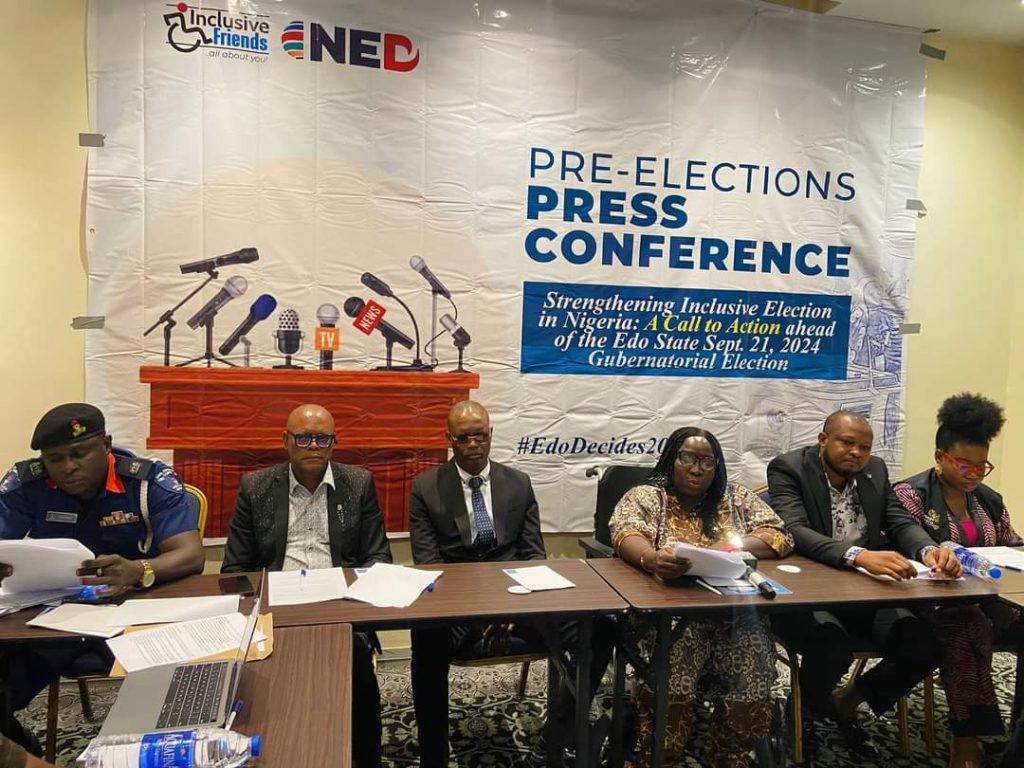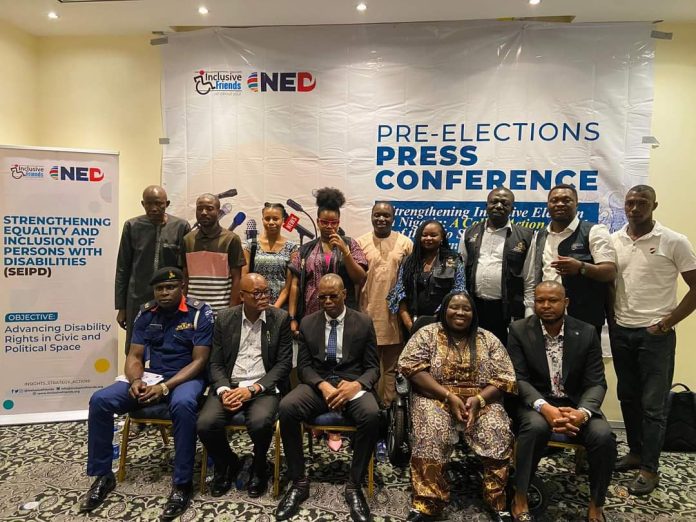Calls for Priority Voting, Accessible Polling Units, and Enhanced Security for Persons with Disabilities
As the countdown to the 2024 Edo State gubernatorial election continues, advocacy for an inclusive electoral process is gaining momentum. Inclusive Friends Association (IFA) in partnership with The Joint National Association of Persons with Disabilities (JONAPWD), Edo State chapter, has called on the Independent National Electoral Commission (INEC) to implement critical measures that will enable Persons with Disabilities (PWDs) to participate fully and comfortably in the forthcoming polls. The appeal was made during a pre-election press briefing held at the Protea Hotel in Benin City, where JONAPWD stressed the need for barrier-free voting and prioritized accommodations for the state’s disability community.
In her address, the Chairman of JONAPWD Edo State, Ann Ojugo, emphasized that elections are a key democratic exercise, and all citizens, including PWDs, must be able to cast their votes without facing unnecessary obstacles. She urged INEC to take swift action to ensure polling stations are accessible to all voters, including those with mobility, visual, and other disabilities.

“As the 2024 Edo State gubernatorial election draws closer, it is crucial that INEC creates an environment that allows persons with disabilities to vote without barriers,” Ojugo stated. “Our members are eager to exercise their civic rights, and it is the duty of INEC to ensure that polling units are accessible, election procedures prioritize PWDs, and the entire voting process is safe and inclusive.”
Key Recommendations for Inclusive Voting
During the briefing, Ojugo outlined several essential measures that JONAPWD believes will enable PWDs to fully participate in the upcoming election. Among the recommendations is the need for accessible polling units, which would ensure that voters with disabilities can reach their designated polling stations and cast their votes with ease.
“In many elections, PWDs encounter difficulties accessing polling units due to infrastructural barriers such as steps, narrow doorways, or the absence of ramps for wheelchair users,” she said. “INEC must ensure that all polling units in Edo State are accessible, with provisions made to accommodate persons with physical, visual, and hearing impairments.”
Another key recommendation is the introduction of priority voting for persons with disabilities. This would allow PWDs to vote ahead of the general population, reducing the time they spend standing in long lines and mitigating potential physical discomforts.
“Standing in line for extended periods can be physically taxing for many PWDs, especially those with mobility challenges,” Ojugo explained. “We are calling on INEC to implement priority voting measures, so PWDs can cast their ballots quickly and safely, without having to endure long waits.”
Additionally, JONAPWD emphasized the importance of Braille ballot guides at all polling units to facilitate independent voting for people who are visually impaired. This, Ojugo noted, would ensure that blind voters can make their electoral choices without assistance, preserving the privacy and dignity of their vote.
“Voting should be a private and confidential process for every citizen, including those who are visually impaired. The provision of Braille ballot guides at all polling stations will go a long way in making the election more inclusive for the blind community.”
Security and Safety of PWDs During Elections
Beyond accessibility, the safety of persons with disabilities is also a major concern for JONAPWD. Ojugo highlighted the vulnerability of PWDs during elections, particularly in areas where crowds can become unruly or where there is a risk of violence. She called on security agencies, including the Nigeria Police Force (NPF), to prioritize the safety of PWDs on election day.
“Security agencies must recognize the unique vulnerabilities that persons with disabilities face, especially in crowded or potentially volatile situations,” Ojugo urged. “We are calling on the NPF and other security bodies to ensure that PWDs are protected from any form of intimidation or harm while they participate in the voting process.”
The association further recommended that security personnel undergo disability awareness training to improve their ability to interact with PWDs and respond to their needs in a respectful and informed manner. Such training, they argued, would not only enhance security efforts but also promote a more inclusive and welcoming environment at polling units.
Appreciation to Inclusive Friends Association
JONAPWD expressed its gratitude to the Inclusive Friends Association (IFA) for sponsoring the pre-election briefing and for its ongoing efforts to champion the rights of PWDs in Nigeria’s electoral system. IFA, led by renowned disability advocate Grace Jerry, has been instrumental in promoting inclusive election practices and pushing for reforms that benefit the disability community.
“We are immensely grateful to Inclusive Friends Association, ably led by my dear sister and friend, Grace Jerry, for sponsoring this event,” Ojugo said. “IFA has been a consistent voice for persons with disabilities, and we deeply appreciate their support in ensuring that PWDs are not left out of the democratic process.”
A Call to Action for INEC and Stakeholders
As the Edo State gubernatorial election approaches, JONAPWD’s message is clear: the inclusion of persons with disabilities in the electoral process is not a privilege, but a right. The association is calling on INEC and other stakeholders to heed their recommendations and take proactive steps to remove barriers and enhance the voting experience for PWDs.
“The right to vote is universal, and no citizen should be excluded or face undue challenges because of a disability,” Ojugo concluded. “We urge INEC to act on these recommendations and ensure that the 2024 Edo State gubernatorial election is a model of inclusivity and accessibility.”
With election day fast approaching, the ball is now in the court of INEC and relevant authorities to address the concerns raised by JONAPWD and other advocacy groups. Their response will determine whether Edo State’s electoral process will be remembered as a truly inclusive and barrier-free experience for all its citizens.


